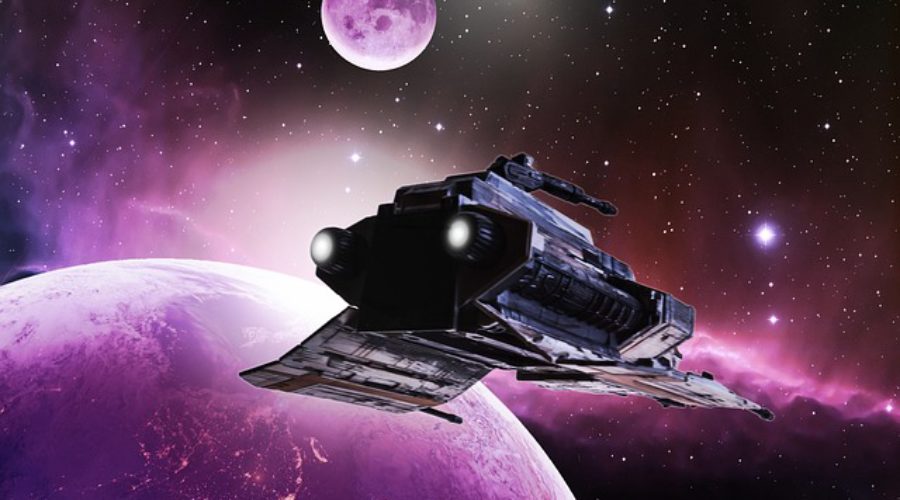Star Trek on the Radio (Sort Of)
This week we got back on track after all our IT problems and released an original play: “First Officer”, a sci-fi adventure with spaceships, explosions and devious betrayal. You can listen to it below and then click on the “more” button for some discussion about the making of the play and what we learned.
But first, the play:
Cutting away the chaff
A mistake all playwrights make, sooner or later ,is taking too long to get to the action. When I sat listening to the recording, I realised that the opening scene of First Officer (the run up to when Lane calls the convoy lead) was far, far, far too long. This made me sad because there was writing to which I was attached (always a warning sign). But nobody wants to listen to two people talking about how tired they are.
This is when the beauty of radio kicks in. I was effectively able to rewrite the first five minutes simply by cutting and reorganising the dialogue. 5 minutes became 2. Much less time was spent chatting about what was wrong with the engines and we moved as quickly as possible to Lane’s first choice: whether to force the Convoy Lead to extend his shields (it makes sense in the play).
Remember, drama is action. You are going to have to cut some fantastic bits of writing, or at the least stuff you love, because it isn’t getting you as quickly as possible to characters making decisions and paying for them: the stuff that people really want to hear.
Sci-Fi is risky–don’t be afraid to cheat.
One of the great dangers of sci-fi is that you lose your audience in technobabble. Now, the story I’m telling could almost as easily have been told on a British Warship in 1943, or a Napoleonic Frigate in 1812: the play is about people, and loyalty, and that which we confuse for leadership. Setting it in the future principally allows me to a) not piss around with reality so I can concentrate on the story and b) have a female captain and sub-lieutenant without it appearing odd.
But setting it in the future means I must somehow explain how spaceships combat works. Except I don’t. I cheat. Red Alert is from Star Trek. Blasters are Star Wars. Both use these mysterious “shields” whose remaining capacity is measured by a mysterious percentage. Borrowing a language that the audience are familiar with allows them to disregard (or accept as normal) the sci-fi dialogue.
The remaining tricky bit was the deal with the torpedoes not working in the asteroid (crucial plot point!) Don’t bother trying to explain this sort of thing. The CHARACTERS understand why it won’t work. So just have them say it and move on (“But sir, the gravity well of the asteroid field prevents our torpedoes working”–“WTF THAT MAKES NO SENSE!!!” shouts the physicist from the back row, except (s)he probably reads comics as well and so is chill with this sort of thing). If you get stuck in the physics, you will leave your audience WAY behind. Concentrate on the action and the consequences of the action.
You’re in a different situation if you’re writing hard sci-fi. Good luck with that.
Awesome fun with Sound Effects
The Sound for First Officer was put together by the exceptional Chris Taylor. This created a problem for me because the theme tune is SO good (go listen to it again) that I feel obliged to go write a sci-fi series using the tune. Ah, damn you, temptation.
One of the fun parts of recording sci-fi is fun sound effects. When you’re writing a radio play, it’s a very, very good idea to include stuff that will be interesting for the sound team. Unusual noises. Unusually places. The sound directions for Hitchhikers Guide to the Galaxy are the worst pile of utter nonsense in the history of playwrighting, amateur or other, but I understand the sound team had an absolute blast.
I wouldn’t go as far Douglas Adams (because I can’t), but phaser blasts, ships exploding, rattling engines, squeak chairs, background scanners–these things are fun to record, and fun to listen to. Try to take that spirit into all your writing. Radio is an audio experience. What would make your play more fun?
PS. For anyone waiting, the shortlist results for the LWRP competition will be released at 1600 today (Paris Time).




